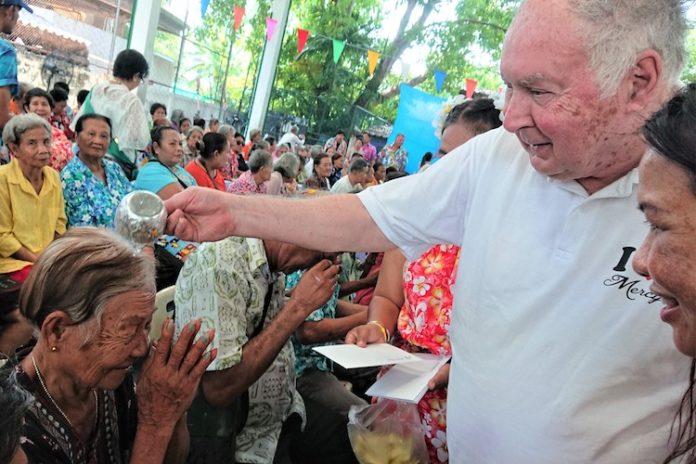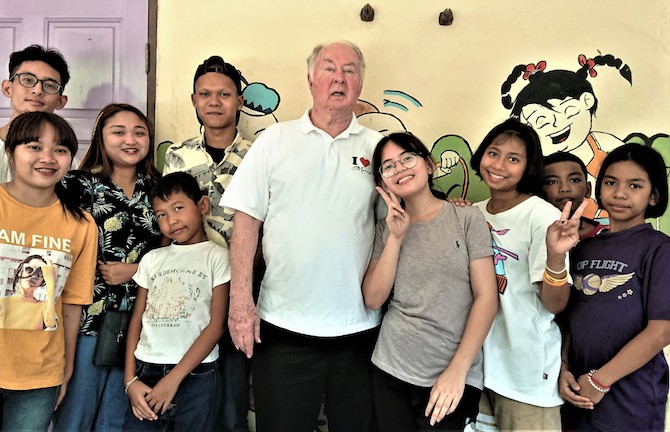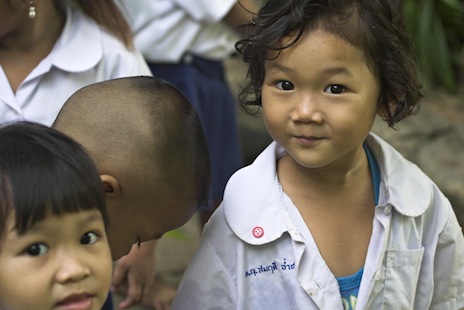
Father Joseph Maier blesses an elderly slum resident during Thai New Year festivities at his Mercy Center in Klong Toey, Bangkok. (Photo by Tibor Krausz)
They are the kids no one wanted. They have been abandoned and neglected, left unschooled and undocumented. Many of them remained illiterate well into their teens.
Attakorn was abandoned by his parents and lived on the street, playing truant from school. “I couldn’t read and the teachers didn’t care about kids like me,” says the boy, a mischievous, diminutive 13 year old with elfish features covered in smallpox marks.
Yodsakorn, a lanky 16 year old, was staying in a children’s home. He wound up there following his mother’s death. “My father is a woodcutter and couldn’t look after me,” he recalls.
Sappasit didn’t fare much better, either. A sickly 17 year old with a somber bearing and prematurely graying hair, he was raised by his single mother, who works as a street vendor. One day, no longer able to support him, she dropped him off at the Mercy Center, an orphanage run by the Human Development Foundation, a Bangkok-based Catholic humanitarian initiative that caters to residents, young and old, in the slums of the inner-city district of Klong Toey.
Yet the three boys are neglected no more. They are studying at the Janusz Korczak School of Southeast Asia, which is operated by the Catholic charity. They are doing so along with 40 other youngsters ranging in age from seven to 20 and from various ethnic, national and religious backgrounds. In classes, where they learn English, mathematics, computer skills and other useful subjects, Thai street kids rub shoulders with the children of stateless refugees and destitute economic migrants from Myanmar, Cambodia and Laos. Buddhists study amicably alongside animists and Christians.
“If not for the Korczak school, none of these students would probably be having any formal education,” says head teacher Napapha Javephuong. “We are helping kids who can’t get into normal schools — kids without proper documents, kids with physical and emotional problems, kids from broken homes and from the street.”
Some of the school’s students are recovering drug addicts who started sniffing glue or taking cheap methamphetamine at a young age in the economically deprived Bangkok neighborhood of tumbledown shacks that is known colloquially as “The Slaughterhouse,” where drug abuse, unemployment and violent crime are rife. Some other students have anger issues or are painfully withdrawn owing to years of abuse. Several are orphans and live in the Mercy Center’s orphanage next door, where hundreds of youngsters have found a new home.
“They are safe here,” says Father Joseph Maier, a Redemptorist priest from the town of Longview in Washington State in the United States. Father Maier co-founded the Human Development Foundation in 1972 with a local nun, Sister Maria Chantavarodom, so as to help “the poorest of the poor” in Bangkok’s teeming slums.
In addition to providing shelter for homeless children and conducting several community enrichment projects, the Catholic charity runs two dozen preschools for some 2,500 disadvantaged children around Bangkok. It has also set up several makeshift schools at construction sites for the children of foreign migrant workers.
“The kids get fed and they can learn,” the priest explains in his trademark rat-tat-tat of pithy sentences. “They can come to us for a week or a month or a year. They can come as long as they need a place to learn.”

Now 79, Father Joe, as he is affectionately known, has been a permanent fixture in Bangkok’s slums for almost half a century. Over the years his once springy gait has slowed and he now needs the aid of both his hands to clamber to his feet from a chair. Yet in spirit the priest remains as rambunctious as ever. He greets moppets who run up to him by playfully knuckle-pumping with them and he quotes liberally from the Harry Potter movies to make his points.
Father Maier also has a seemingly encyclopedic knowledge of the hundreds of people living in his community, most of whom are Thai Buddhists.
“This woman here sells drugs,” he says matter-of-factly about a sinewy local with horn-rimmed spectacles as he takes a stroll around the premises where hundreds of locals have gathered for Thai New Year ceremonies hosted by the Mercy Center. During the festivities, which feature a petal-flecked golden statue of the Buddha alongside a garlanded statuette of the Virgin Mary, Father Maier takes turns with saffron-robed monks in offering blessings on the gathered in a testament to the ecumenical spirit of his ministry.
“That man there picks up dead bodies from the street,” Father Maier says, indicating an avuncular fellow with a pencil moustache who makes a living by taking corpses to a local morgue. “This woman here,” he adds, regarding a sullen matron in a flowery shirt, “sold her six-month-old niece to a foreign couple who wanted to adopt a child.”
Father Maier passes a young woman sitting alone on a stone bench. “She’s a sweet person,” he observes. “You wouldn’t know by looking at her that she has two murders to her name.” The woman allegedly stabbed two of her brothers to death with a kitchen knife in a domestic dispute during which the men, high on drugs, wanted to harm her newborn child.

A little girl with braided locks scurries by on her way to the playground. “She’s a refugee child,” Father Maier observes, asking that the girl’s country of origin not be identified for political reasons. “She’s illegal in Thailand and can’t go to [a local government] school,” he adds. “But now she goes to the Janusz Korczak School. She’s learning to read, and she has friends, and she’s not alone. Isn’t that something?”
The priest set up the school for undocumented children and youngsters with special needs in 2004. He named it after Janusz Korczak, a Polish Jewish pedagogue who died in the Holocaust while trying to protect orphans under his care. “Korczak was a good man,” Maier says. “He did not abandon his children and nor will we abandon ours.”
The school is housed in a nondescript one-story building that blends seamlessly into its surroundings of modest dwellings. Yet its humble exteriors belie the school’s importance for the dozens of youngsters who attend it. It’s only at the Korczak School that many students can learn basics like literacy and arithmetic.
One of them is Yodsakorn, the gawky teen. “I’ve learned to read and write here,” he says. His friend Attakorn, the former school dropout, concurs. “I love studying here,” he notes. “This school is different. Here the teachers help us and care about us.”
In addition to the usual subjects, the Korczak School’s students also learn life skills. They have their own do-it-yourself bakery in the school’s small kitchen, selling cakes, sweet rolls and cups of coffee to locals. Proceeds from sales help cover the school’s operation costs. They also cultivate chili peppers, tomatoes, basil, mint and various herbs in well-tended little plots out back. The idea behind such hands-on projects is to enable students to learn responsibility, to acquire employable skills and to try their hands at running their own business.
“We provide schooling and training for disadvantaged youngsters so that they can turn their lives around and go on to something better,” head teacher Napapha says. “A street kid who couldn’t read or write when he came here now works as the manager of a Pizza Hut restaurant. We’ve had many success stories like that.”
Another successful ex-student is Sunisa Soloku, 27, who comes from an impoverished hamlet of Akha hilltribe villagers in northern Thailand where locals eke out a living doing odd menial jobs and selling trinkets to tourists. Sunisa spent four years at the Korczak School, where she learned to speak proper Thai and to read and write. She has recently graduated with a bachelor’s degree in accounting from a Thai college.
“The Korczak School helped lay the foundation for my life,” Sunisa says. “I’m the first person in my family to graduate from school,” she adds. “I’m definitely the first to graduate from university.”
(Tibor Krausz, Bangkok, ucanews.com)
Father Joe Maier and the Bangkok Slaughterhouse (video)
https://redemptorists.ca/social-justice/father-joe-maier-and-the-bangkok-slaughterhouse





